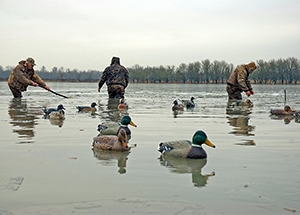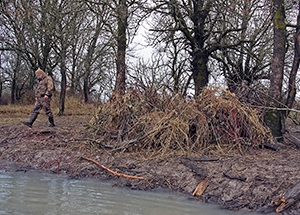
9. Be ready to break ice. In freezing conditions, bring something to break up some ice and create open water for ducks to land. In thin ice, a garden rake is a good option. You can break up large sheets and use the wide rake to help push those sheets under the remaining ice.
10. Be prepared for cold weather. And not just for you. Make sure there’s a dry place for your dog – standing in even a few inches of freezing water can take a heavy toll. If you’re hunting with someone who’s not used to the cold, consider bringing a portable heater for your blind or boat. Late season duck hunting doesn’t have to be a survival sport. The longer everyone is comfortable, the longer your hunt can be.
11. Scout to find birds. Scouting isn’t just an early season activity. With variable winter weather conditions, hunters will need to follow the birds as they move to better locations. Scout newly flooded fields after heavy rain events. Revisit frozen ponds after a warm spell. They may have melted and drawn ducks back. In eastern Oregon, check out rivers that are fed by warm water springs. These kinds of rivers can hold ducks when everything else is frozen
You don’t have to be an expert hunter to get ducks in January. Instead, focus on patience, concealment and flexibility to help you bag your limit.



